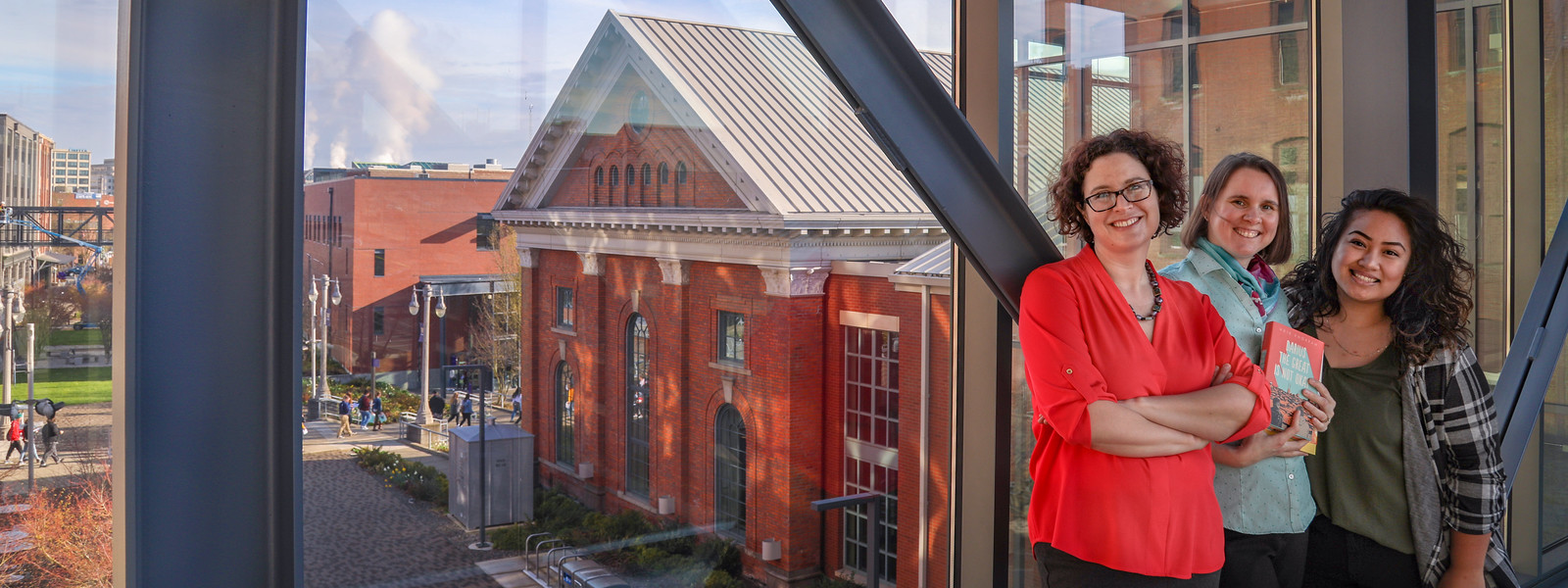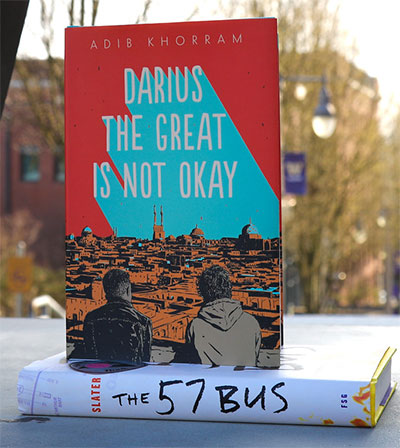
Reading for Social Justice
Real Lit[erature] bridges the gap between faculty, staff and students to cultivate conversations through literature about challenging issues facing our society.
(Photo above, at left is UW Tacoma Reference and Instruction Librarian Johanna Jacobsen Kiciman. Center: Research Specialist Kari Whitney. Right: Center for Equity & Inclusion Program Support Supervisor Nedralani Mailo. Not pictured: First-Year Experience Librarian Alaina Bull.)

Real Lit[erature] is breaking down barriers to discuss social justice in the community. Created by members of the UW Tacoma Library and the Center for Equity and Inclusion (CEI), ReaLit (for short) intends to demonstrate the value of developing community alliances through written narrative. “We believe that using a novel to discuss contemporary societal issues allows for hard but necessary conversations to take place,” said Reference and Instruction Librarian Johanna Jacobsen Kiciman. “Joining a book club is also a fantastic way to create community by reducing isolation.”
ReaLit began as an idea in the summer of 2018. “As we were working together to grow this project, we saw the space and need to discuss social justice from a non-academic standpoint,” said First-Year Experience Librarian Alaina Bull. “In using literature as a conduit, it's easier to have genuine conversations about experience.” Jacobsen Kiciman added, “Discussion in academia often reproduces power dynamics, and that is exactly what we want to break down and examine in this book club.”
Kari Whitney, a research specialist in the Library, noted, “Compared to what other university libraries offer for student engagement with social justice, this project is somewhat unusual. The interdepartmental alliance makes the program stronger, and is clearly what works.”
During their pilot quarter in autumn 2018, ReaLit members read Angie Thomas’s The Hate U Give, which sparked discussion about police brutality and the Black Lives Matter movement. The group read through the book together over the course of five meetings. At the end, the group held a Skype discussion with the author. “We got lucky because the authors we chose for both quarters immediately said yes to doing a Skype call to discuss the book with the students,” said Bull. Jacobsen Kiciman added, “About 20 campus members including students, staff, and faculty joined us for the Skype call, including some who weren’t about to commit to consistent meetings during the quarter due to schedule conflicts.”

Bull added, “Overall the first quarter was very successful. We had a small student base that allowed us to have really quality conversations. It also gave us some ideas about what needed development.”
As the second iteration of the book club came together for winter quarter 2018, the ReaLit organizers made adjustments based on feedback from the first session. They sought to make the group more student-centered and put the book choice up for a vote between five titles. The group chose The 57 Bus by Dashka Slater, which has themes of gender identity, institutionalized racism, and the prison system. In order to broaden the conversation based on themes within the book, ReaLit has sought to extend their community ties to student groups on campus by inviting them to speak about their experience. “Bringing people in who relate to themes in the book, especially student groups, has been a way to expand on the experiences of people within ReaLit and make connections with other organizations on campus.” said Center for Equity & Inclusion Program Support Supervisor Nedralani Mailo.
The project has blossomed as a partnership between the Library and CEI, drawing on the resources of both organizations to enrich the lives of students in and outside the club. “Creating a partnership between the Library and CEI shows a different form of how social justice plays out across different platforms,” said Mailo. “Our advertising has had the aim of bringing these two communities, both faculty and students, together. As a result, we’ve seen more people coming to CEI through the Library and vice versa.” Bull agreed saying, “Our hope is that, through the club, students from each side will feel encouraged to further discover the resources of each department and make connections with each other and staff to know that both places are safe spaces.”
As a part of their long term vision, the ReaLit organizers hope to incorporate high school students into the conversation and open up connections locally to fulfill the urban-serving mission of UW Tacoma. Other ideas include campus-wide reads, and incorporation of staff and faculty into the conversation. Bull said, “Organizing this book club was a learning experience for all of us. Being able to see that there was a demand, a reaction, and desire for this kind of space for students to share experience and quality conversation with peers and faculty is so important.” By investing in the significance of talking about real life issues and books that focus on the current day, ReaLit provides a unique opportunity for students to establish discourse about social justice outside of the classroom. “In creating a book club grounded in principles of social Justice, we hope to continue to create and foster a space for our community to have important conversations through the lens of literature,” said Jacobsen Kiciman.
In spring quarter, ReaLit is reading Darius the Great is Not Okay by Adib Khorram, which explores the complexities of mental health. To supplement this discussion, they are collaborating with experts from the Student Counseling Center to talk about depression and resources available for students.



